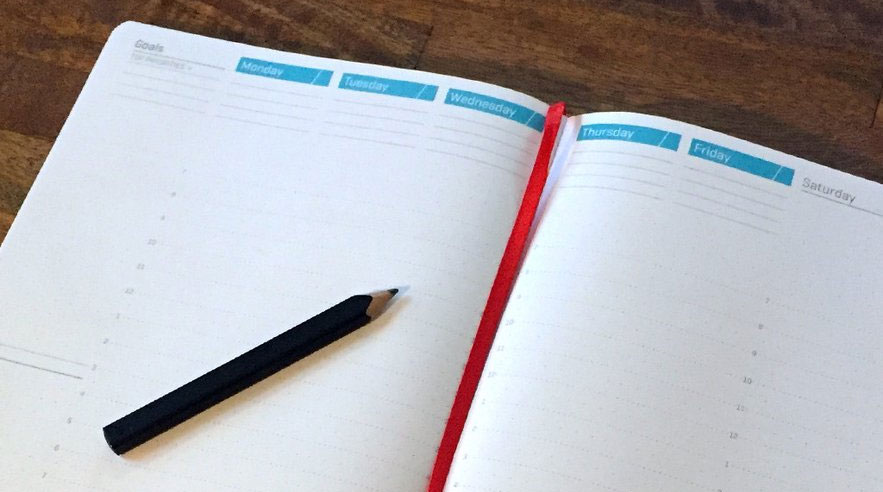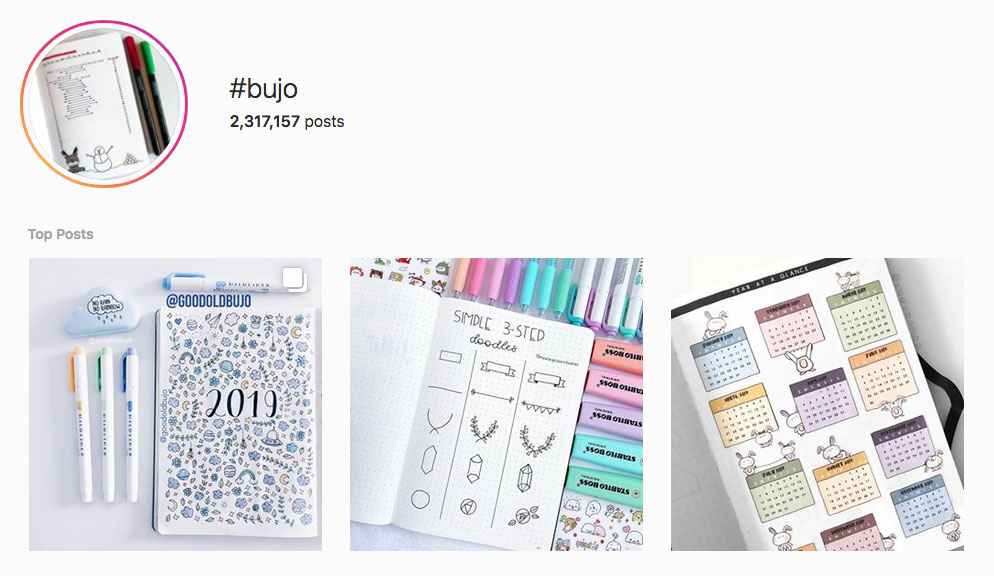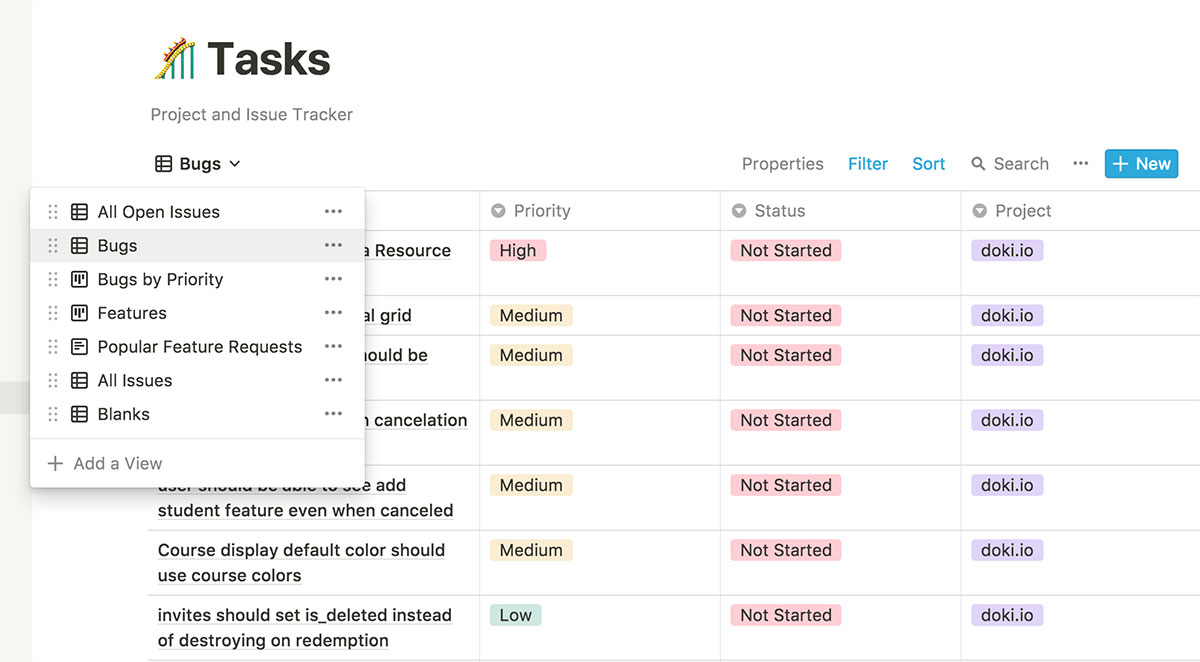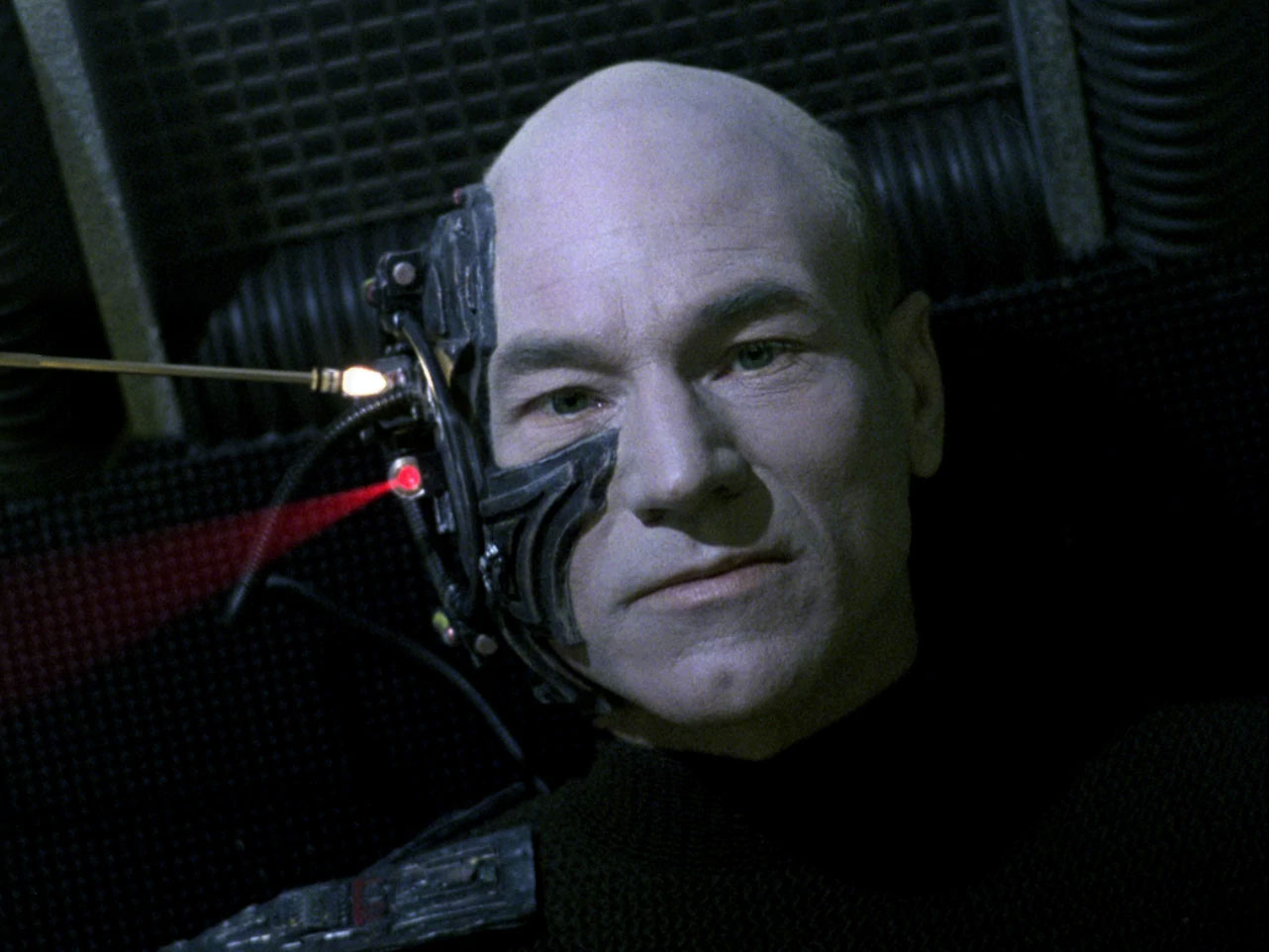I confess that I've been in productivity limbo for years.
You know that awful grey area where you're in-between systems and tools; you haven't quite committed to a single one yet.
Or you did commit, but the system isn't quite what you need, so you kind of use it, but not consistently enough to be useful.
It's having Asana or Trello alongside half-filled paper planners, notebooks, digital to-dos, Evernote files, etc.
It's hoarding empty notebooks because you're waiting for the perfect time to use the one with the dot grid.
It's trying out several planners at the same time because you're trying to find the one that "works."
It's downloading new productivity and habit tracking apps in batches while you try to find the "right" one.
As a tiny business consisting of two co-founders who handle all of the day to day operations (yes, it's just us!), we rely on strong systems to help us keep projects humming along. We've both experimented with many different technologies to help us manage our client workload, our software bug tracking and feature requests, and even house projects.
The Problem
One of the biggest issues for me personally was that I didn't have one place where I could get both a 10,000 foot view of my goals and vision, while also managing day-to-day to-dos AND ideas. I was struggling to translate the big vision into the daily action required to make it happen.
I was managing client work in Asana, but struggled to use it for managing our internal "marketing to-dos."
I had a paper weekly planner to manage + plan my week, but found myself relying more on Google calendar to do time-blocking and planning.
I was tracking client meeting notes and marketing ideas in Evernote, but wasn't going back to review my notes once I'd created them.
I couldn't quite put my finger on what was wrong.
Each system was powerful on its own, but I didn't have a master process that pulled them all together in a cohesive, consistent way. I was in limbo, and I knew it was affecting my ability to focus and plan properly.
I didn't have an easy way to visualize my long and short-term plans in a way that would help me turn them into action.
The closest thing I found was the Neu Year Week Dominator.
 Undated & Productivity Weekly Planner Calendar - Neuyear.Net
Undated & Productivity Weekly Planner Calendar - Neuyear.Net
I'd make my yearly and 90-day plans, but unless I pasted them on the wall in front of me, they'd sort of sit in a planning folder on my desktop that wasn't really getting reviewed regularly.
Sometimes the issue is habitual (📝 Why we said goodbye to Netflix during weekdays), but sometimes it's the system.
Deep in the rabbit role
Finally after the fourth abandoned cart check-out on Agendio—realizing that the damn paper planner was going to cost about $90 after shipping (and who knows how much after customs)—I decided, I'll make my own! (😐)
I took all of the best parts of all my favourite half-used planners and started designing my own ULTIMATE PLANNER.
A few weeks into designing said ULTIMATE PLANNER, I realized the ugly truth:
I am not someone who can plan on paper.
I didn't want it to be true. I don't even know why?
Ok, this is probably why:
 The #bujo—AKA "Bullet Journaling"—hashtag on Instagram
The #bujo—AKA "Bullet Journaling"—hashtag on Instagram
(That, and it almost felt like I didn't want my reliance on digital systems to be so...omnipresent.)
I wanted to get on the bullet journal bandwagon, but the sheer inefficiency of hand-drawing the same lines, shapes, numbers, and tasks week after week, and month after month made me twitchy.
Looking at some of those bullet journal masterpieces made me wonder, how much of bullet journaling is just...productivity porn? Are people creating entirely separate accounts for their bullet journaling as a creative outlet, or to distract themselves from actually getting shit done?
I didn't know the answer, but I decided to swallow my envy of those beautiful bullet journal masters and resist the urge to get distracted by a new shiny thing that was certainly going to be more of creative outlet than a functional productivity tool.
Side-note: This is not a knock on bullet journaling itself; I know it's a system that works for so many friends and clients!
I rely so heavily on the efficiency of digital systems and tools, that I decided to stop fighting it, and to simply refine my digital processes to make better use of my existing tools.
The Catalyst
After completing my Permaculture Design Certificate, I became even more enthralled with systems, and looking at everything as a functioning ecosystem. I was so inspired by permaculture systems thinking that I did a talk about this at MicroConf in the spring.

Ecosystems and sustainability were the threads of meaning running through my work that I hadn't quite named or pinpointed.
In late 2018 I decided to pursue my Permaculture Diploma and take my learning to the next level.
This is a pretty documentation-heavy process that would unfold over the coming years. My teacher/mentor is highly creative, and encouraging of using mixed media to express my learnings using plenty of visuals, video, etc.
I'd dabbled with Notion* before, and it seemed like the perfect tool to track my vision and ideas in a creative non-linear way that would allow me to embed links, video, scrawl quick notes, store my ideas, make reading lists, to-dos, etc. It was the perfect way to blend creative thinking with documentation and action items.
Previously, I'd been relying on Asana for my high level planning, but it was clunky.
Sure, it can be done (I've probably watched all of Paul Minors' Asana videos), but I realized that I was pigeonholing all of my planning and thinking into "to-dos."
Asana was great for tracking things that simply needed to get done and were time-sensitive, but what about idea storage, percolations, references, and things to consider over time? To me, Asana didn't feel like the right place for this.
The system has to work for you.
So I got to work using Notion to start documenting and giving structure to my diploma project.
Before long, my creative projects were now becoming part of my workspace (like sewing, house projects, etc). And then I started using it as a habit tracker. Then I started outlining my personal philosophy and vision.
I was suddenly thinking more about my legacy than my daily to-dos.
I became inspired to build success rituals into place. I started researching morning routines, habits, and bigger goal planning.
I built a weekly digital planner that helped me better see my goals, milestones, tasks, reflections, and habits in one place.
Working on my diploma documentation inspired me to get better about documenting my life and business in a more holistic way.
What's been working (for us)
The new system that has made all the difference is a combination of the right tool with the accompanying habits and routines.
No one tool can help you if you don't have good habits in place, but certainly having a tool that's easy and delightful to use can make a world of difference, and for us it has.
It took some serious discussions as I was moving deeper into Notion and starting to neglect Asana (which meant any to-dos that Ben was assigning to me were simmering on the backburner). I knew that me using Notion while Ben continued using Asana wasn't really going to cut it. I had to get buy-in from Ben so that I wouldn't be split across two different tools trying to do the same thing.
Given that Ben manages our software features and bug tracking (and probably had thousands of tiny tagged tasks living inside Asana) I personally felt that it was essential that Ben have a say in our primary systems. Truthfully, I'd already dragged Ben from Teamwork to Asana years ago, and didn't just want this to be a shiny new tool. Ben initially hated Asana as well, but grew to love it when he discovered custom fields, so I was confident I could convince him to love Notion too.
I showed him how I was using it, and made the case for my improved productivity. We spent a few weeks playing with the possibilities, setting up workspaces, and transferring tasks over to see if it would be feasible. Changing systems is no joke!
We debated the pros and cons of the different tools, and really hammered out how we might need to make major changes to our workflow in order to both feel like we could be happy and productive.
The beauty of Notion is that it allows for database-style information to be combined with very different content styles. It's incredibly open-ended, which was initially frustrating for Ben, as he had gotten so used to the ease of Asana's to-do list creation. This meant we had to create our own systems within the tool. I was a little more excited about this than Ben. I finally felt like I found a tool that worked with how my brain worked.
In the end we realized how much more powerful it was, because it helped us bridge the gap between our two very different ways of thinking, planning, and doing.
Cue music. Throw confetti.
 His and hers.
His and hers.
The Magic
As you know, changing systems is damn time-consuming, so we wanted to share what has worked for us as we've gotten to know the features and what's possible. You know a tool is good when you want to find more reasons to use it.
Here's what we've found works:
A space for big picture planning/visioning
 TEMPLATE: https://www.notion.so/okidoki/TEMPLATE-Annual-Planning-7d4af6c3450043ca8cbf199a43566dde
TEMPLATE: https://www.notion.so/okidoki/TEMPLATE-Annual-Planning-7d4af6c3450043ca8cbf199a43566dde
A weekly template
This template has evolved every week for the last 2 months while I've figured out what to track, and the best way to track it.
 TEMPLATE: https://www.notion.so/Weekly-Agenda-4b1dbb285e724494bc36a32a378b5d7a
TEMPLATE: https://www.notion.so/Weekly-Agenda-4b1dbb285e724494bc36a32a378b5d7a
This one template alone has completely changed my productivity habits. It's the one singular place where at a glance I can see:
- What my week looks like energetically (how heavy is the workload?)
- The top 3 most important things I need to do each day
- What general tasks need to get done
- What I eat, how much I exercise, and how much water I'm drinking
- What I'm grateful for every day
- What I'm learning or reading from week to week
- Whether or not I keep overbooking myself
- My reflections on the week
- Important notes or links
- Things that were planned but didn't get done
Every Sunday, I duplicate the weekly template, and begin filling in the upcoming weeks' known tasks, to-dos, and meetings.
To-do items are added with the client shortcode.
Meetings are marked in pink so I can easily see time-sensitive events, and also get a sense of my energy requirements for the day/week.
To-do items that don't get completed are duplicated into the following day, and then get crossed out like so. This helps me to see at a glance how often I miss the mark with my planning (overbooking, overcommitting, or not leaving enough time), and allows me to better gauge my time the next week. It's a way to be more mindful, and also to set better boundaries for myself.
The key is that this becomes the place that you check every morning. I keep Notion open throughout the day, and add notes, to-dos, and keep things updated daily.
Master tasks database
It took us a while to decide on the best way to do this, but we ended up creating a large master task list that contains ALL of our tasks. We then filter views of this database where we need them. (You can embed filtered Database views into any other pages).
Ben likes to note how this was a real adoption hurdle for him, as Notion doesn't have a standardized top-level view of all your date-based tasks in multiple database-views. The master task list was his workaround.

Templates for client projects
The beauty here is that client templates, notes, and to-dos now all live in the same place.
A the top of each Client template is an embedded database that pulls all tasks from our master task database filtered by Client.
This allows me to see at a glance all of the to-dos with dates and status (waiting on feedback, complete, in-progress, etc), and also allows me an area below where I can store notes, resources, thoughts, links, etc. We also use it to track our estimated time and revenue per client.
Other super fun ways we're using Notion:
MARIE
Studies
I'm tracking all of the courses I've purchased and completed over the years, along with notes as I go through each course.

Marketing
I store links and inspiration, tasks and to-dos, and swipe files of email marketing campaigns and sales pages to name a few.
We store links to all of our branding elements, bios, headshots, etc. for easy access.
I write my blog posts in Notion, export as Markdown, Ben uploads to the website. SO easy.
Girl Guides
I store my notes, forms, schedule, to-dos, and everything else related to my role as a guider.
Revenue Projections
We have spreadsheets set up to help us estimate our yearly revenue based on projected revenue and outgoing invoices.
Creative Ideas
I track and document my creative projects: learning to knit, fixing up furniture, sewing projects, etc.
BEN
Emergency Preparedness
Ben has been putting together lists of things we have and things we need in order to be ready for various kinds of emergencies. Let's be real here, this was never going to happen on my to-do list...
House Projects
Ben has started using Notion to keep track of upcoming house projects and things we need to budget for over time.
Outreach, Research, Studies
Ben uses the light database views to track outreach, companies he might like to work with, and tracking statuses of his studies in firefighting and programming.
These are just a few of the ways we've integrated Notion into our daily routines. Because the tool is so flexible and adaptable, you really need to put the time in to make it work for you. Once you've got your workspaces in place, the next step is building the routine of using it as your daily launchpad.
 Fully integrated.
Fully integrated.
Fair warning, you may lose a few days/weeks as you start playing with the possibilities.
I promise it's worth it.
I can honestly say that even with all the time investing in setting it up for our needs, I feel like it has easily doubled my productivity. Now instead of Netflixing in the evenings, I'm playing in Notion; catching up on reading, taking all those the courses I've paid for because it's all so easily VISIBLE.
It's much harder to lose track of ideas in this space.
I'm not saying Notion is necessarily your best solution, but I can say that after years of procrasti-productivity and trying to find "that one system that finally works," I've been blown away by this tool.
NOTHING else has quite compared to new habits I've been able to develop now that I've found a piece of tech that works the way my brain works.
It's the best of Evernote + Asana + Trello + Google Spreadsheets.
Oh, and it was less than a third of the cost of what we were paying Asana. :)
Feel free to play around with these templates. I can guarantee they'll evolve, but hopefully they give you a starting point if you're thinking about giving Notion a try. Enjoy!
Want more Notion?
Francesco from Keep Productive interviewed me and I gave him a behind the scenes look at how I use Notion.
Check out my Notion how-to videos and join me as the host of Notion’s Office Hours—every Friday on Crowdcast.
Want more information, education, or training on Notion and how you can use it to improve your workflow? Visit mariepoulin.com.
* Referral Link Disclosure: We use, pay for, and love Notion. Links to Notion in this article have a referral code attached to them. You can get a $10 credit if you sign up with our link, and we also get $5 credit when you do.
